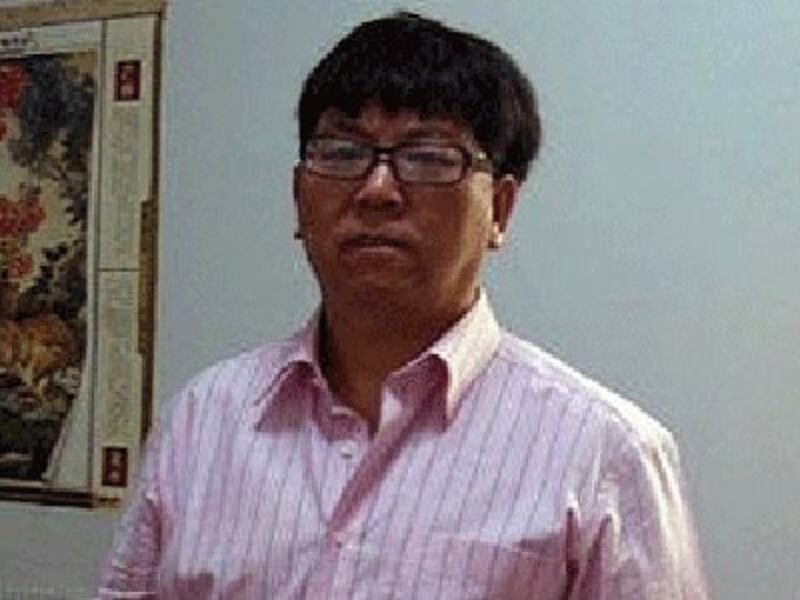Authorities in the eastern Chinese province of Zhejiang on Tuesday ended the subversion trial of two members of a banned opposition party after both men pleaded not guilty, their lawyers said.
Lu Gengsong and Chen Shuqing, both members of the banned opposition China Democracy Party (CDP), stood trial on Tuesday at the Hangzhou Intermediate People's Court for "incitement to subvert state power,"
their lawyers said.
"We had a spirited debate about the defendants' membership of the CDP, and their activism within it, as well as articles they published overseas," Chen's defense attorney Fu Yonggang told RFA after the three-hour trial ended.
"They claimed that their attending a meeting in Huangshan and a condolence event was evidence of subversion," Fu said. "I challenged them, asking what part of those actions constituted incitement to subvert state power."
Around a dozen supporters braved the rain to gather outside the court buildings, which were cordoned off by police and plainclothes officers.
Supporters were denied permission to enter the courtroom, while three entry permits were issued to each family.
Fu said the prosecution's case hinged on the two men's activities with the CDP, and also on the publication of articles on overseas websites.
"Their intentions were good; they wanted their country to improve, and for its people to be happier," he said.
"There were a lot of constructive opinions expressed in them."
Chen's wife Zhang Donghong said her husband had pleaded not guilty, repeating his plea in his final statement.
"I was there for the whole trial," Zhang said. "He tried to explain the relevant views of the CDP."
She added: "Chen Shuqing seemed in fairly good spirits, and he didn't seem to have lost or gained weight."
"He spoke very well, although I can't repeat all that he said to you," she said, adding: "I thought that everything lawyers Liu and Fu said was very reasonable."
Lu's defense attorney Mo Shaoping said his client was tried at the same time for the same crime.
"They talked about his articles, and the meeting in Huangshan, and a few other gatherings," Mo said.
"We argued that he is not guilty, on the basis that the prosecution had insufficient evidence," he said.
"It's finished now, and there was no verdict; that will be announced soon," Mo added.
Fellow defense attorney Ding Xikui said Lu, 58, had been prevented from finishing his final statement by court officials.
"There was too much language in it that the court officials didn't agree with, such as comments about the [ruling Chinese] Communist Party, and about persecution, illegal actions by the authorities," Ding said.
"He spoke for a very long time, and eventually they cut him off, wouldn't let him finish," he said.
"They told him that the words he was using were a threat to state security, were the language of incitement to subvert state power," he said.
Fellow defense lawyer Liu Shuqing said the defense had also been denied permission to call witnesses during the trial.
"My client Chen Shuqing spoke in a spirited way in his own defense, and pleaded not guilty," Liu said. "Overall, I think I and Fu Yonggang made a pretty good argument that he wasn't guilty, too."

Under house arrest
According to fellow activist Xu Guang, a number of CDP members were held under house arrest on the day of the trial, while others were taken out of town on forced "vacations" by state security police to prevent them showing up at the court.
Some were also detained outside the court buildings, Xu said.
"Jin Jimin was taken away [from outside the court] to the police station, but they let him go soon afterwards," he said.
"There were more police and state security police than there were would-be spectators," Xu said.
Lu and Chen were detained within a few weeks of each other in September and October last year on identical subversion charges that commentators said were designed to send out a strong message to other activists.
Lu's wife said the move was likely a form of retaliation for his advocacy work on behalf of ordinary people with grievances against the ruling Chinese Communist Party.
Lu's detention is also believed to be linked to posts he had made online regarding rampant official corruption.
Chinese president Xi Jinping has launched a nationwide anti-graft crackdown, targeting high-ranking "tigers" and low-ranking "flies," since coming to power in November 2012.
But the party regards any popular involvement in the anti-corruption campaign as highly sensitive and potentially threatening, and has sentenced a number of activists to jail for calling on officials to reveal their wealth.
Chinese political activists first tried to set up the CDP by applying for an official permit from the Hangzhou civil affairs bureau in December 1998, but the attempt ended with the sentencing of three of the group's founders to lengthy jail terms.
Zhejiang dissident Wang Youcai, Wuhan-based Qin Yongmin, and Beijing-based Xu Wenli were sentenced, respectively, to 11, 12, and 13 years in prison on charges of "instigation to subvert state power."
Also sentenced were Sichuan-based Liu Xianbin, Beijing-based Zha Jianguo, and Hangzhou-based Zhu Yufu, Chen Shuqing and Wu Yilong, all since released, though Liu has been redetained.
Xu Wenli and Wang Youcai were exiled to the United States on "medical parole" on Dec. 24, 2002, and March 4, 2004, respectively.
Reported by Yang Fan for RFA's Mandarin Service, and by Hai Nan for the Cantonese Service. Translated and written in English by Luisetta Mudie.
